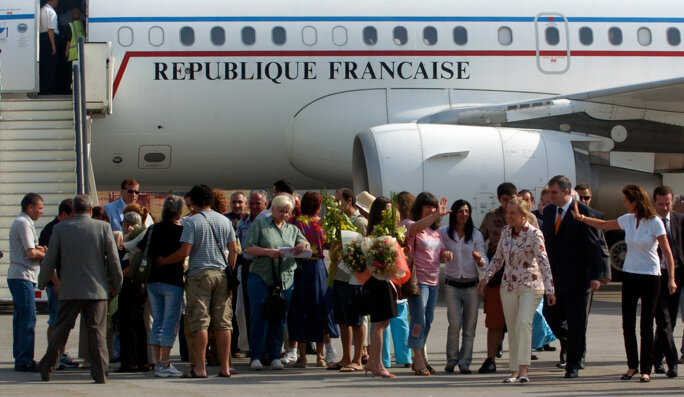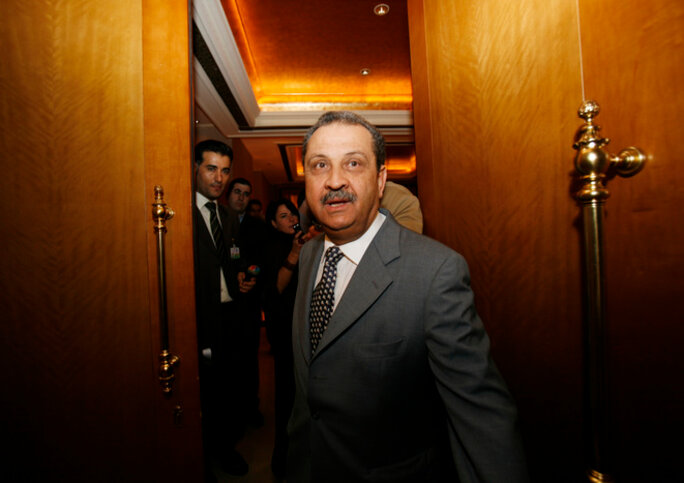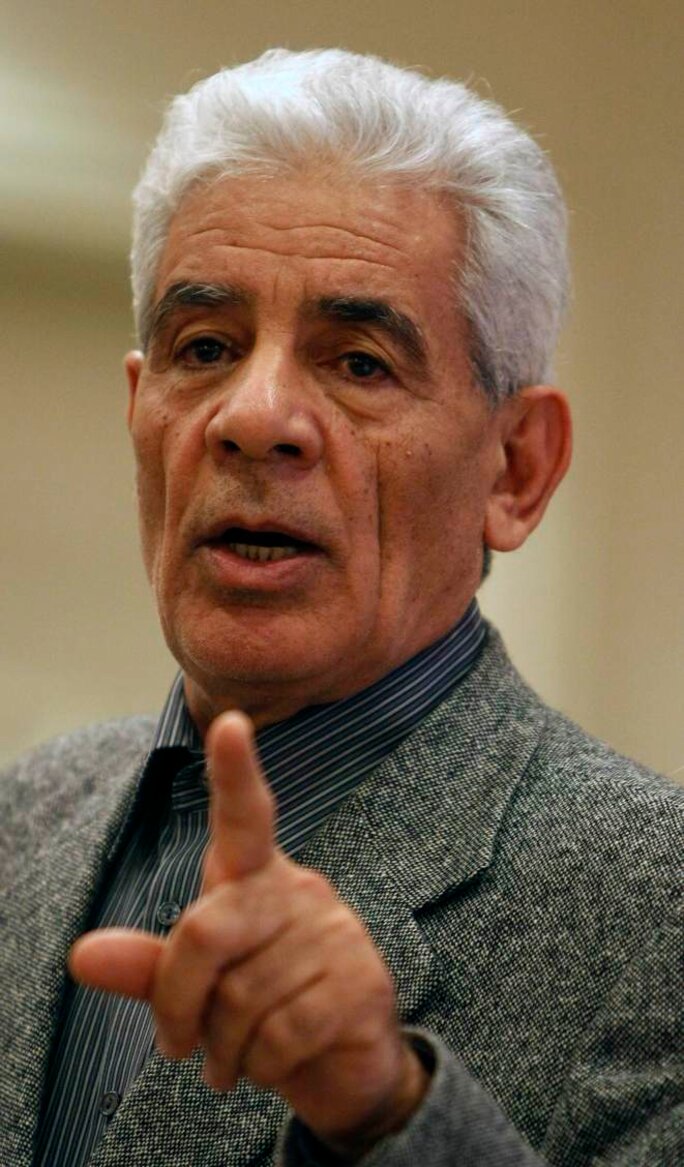If the facts are confirmed, it will be a unique type of state crime. A diary kept by a former Libyan prime minister claims that two senior Libyan intelligence chiefs in the Gaddafi regime themselves infected hundreds of Libyan children in a hospital with the HIV virus. This “special operation” at Beghazi in 1998 is said to have carried out by military intelligence chief Abdullah al-Senussi and foreign intelligence chief Moussa Koussa, Mediapart can reveal.

Enlargement : Illustration 1

The astonishing claim that Libyan officials gave the HIV virus to Libyan children was apparently admitted by Senussi in front of witnesses in 2007, not long after the liberation of five Bulgarian nurses and a Palestinian doctor who had been wrongly accused of playing a role in the epidemic that saw more than 400 children catch the virus at the El-Fatih Children's Hospital in the late 1990s. This admission was then recorded in a personal diary by Libyan prime minister Shukri Ghanem, who was later to die in mysterious circumstances in Vienna. Ghanem's diary has also revealed details of claims that Libya funded Nicolas Sarkozy's 2007 presidential election campaign.
According to this account Senussi and Koussa “procured the phials of the contagious virus”; Sanussi had four while Moussa Koussa had obtained 27. Between them the two men coordinated the contamination of 232 children at the Benghazi hospital. Their aim was to create a tragedy for which they could blame the West. By 2006 some 52 of the children contaminated had died.
After his death in Vienna in April 2012, Shukri Ghanem's diary was found by Dutch police in his son-in-law's safe in Hollande, and is now in the hands of French judicial investigators. In it Ghanem, who was prime minister of Libya from 2003 then its oil minister until 2011, goes over the details of the six foreign medics who were the target of a judicial plot in Libya for eight years between 1999 and 2007.
The back drop to the astonishing claims was an epidemic of the HIV virus that had hit the Benghazi hospital in 1998, an epidemic that caused an outcry in the country. The country's leader Muammar Gaddafi took personal charge of the case and declared that the guilty people would be found and punished. Five Bulgarian nurses were arrested on February 9th, 1999, with a Palestinian doctor arrested a few days earlier. All worked at the children's hospital.
For the hospital staff it was a nightmare. The authorities needed to find culprits and confessions were duly extracted. The United Nations Human Rights Committee later detailed some of the torture techniques used by the Libyan security services to extract the confessions: electric shocks on genitals, suffocation, strangulation, cigarette burns, sleep deprivation, ice-cold showers and rape.

Enlargement : Illustration 2

The Libyan justice system accused the “suspects” of having deliberately infected 393 children with HIV – a number raised to 462 in a later indictment. On April 26th, 2001, during an African summit on HIV in Nigeria, Gaddafi accused the CIA and Israel's Mossad of being behind the contamination of Libyan children, as proof of an American-Zionist plot to target Libya. “It's a tragedy, a catastrophe, an abominable crime! We have proof that these doctors received the order to carry out experiments with the AIDS virus on our children,” he declared.
All six medics were later condemned to death, with the sentence confirmed twice by a senior judge in Tripoli, Mustafa Abdul Jalil. He was later placed by France at the head of the National Transitional Council (NTC) during the Libyan revolution of 2011.
Between 2005 and 2007 the Bulgarian nurses affair, which captured the attention of the world, was the object of major negotiation between the European and the Libyan regime. Their liberation in July 2007 was the start of much closer Franco-Libyan relations under the newly-elected President Nicolas Sarkozy. It culminated with the six medics flying out of Libya on July 24th, 2007, on a French plane accompanied by the president's then-wife Cécilia Sarkozy, who had also made an earlier trip to the North Africa country.
The EU and French authorities had in fact got the six medics released in the middle of the night while Muammar Gaddafi was asleep. This provoked Gaddafi's fury, as noted by arms dealer Ziad Takieddine, who was used as a go-between with Libya by the French authorities. In a note written on September 3rd, 2007 he said: “The Leader [editor's note, Gaddafi] did not appreciate the 'kidnapping' of the nurses during his sleep. He was not woken or informed so his approval could be given. He was angry with all his ministers.
'Senussi said it was they who had injected the children'

Enlargement : Illustration 3

It was this anger that Shukri Ghanem, the former prime minister and then oil minister, recorded very precisely in his journal. In a note dated July 26th, 2007, just two days after the release of the six medics, Ghanem says that he had received a visit from a senior military judge from Tripoli, Mohamed Bachir Al-Khaddar, a member of the inquiry commission set up in relation to the liberation of the foreign medical personnel. The judge said that a furious Gaddafii had suspended several senior figures in his administration and had called in one of his closest allies, Abdullah Senussi, who was the head of the country's military intelligence and also Gaddafi's own brother-in-law, for a reprimand.
“During the interrogation, Abdullah Senussi received insults from the Supreme Commander, who called him a servant who had been given the honour of approaching his family”, wrote Shukri Ghanem, who continued: “Abdullah Senussi cried during the interrogation, saying that he was suffering from cancer, that the Bulgarians were innocent and that it was he who obtained the phials of the contagious virus (numbering four), along with Moussa Koussa (27 phials), that both of them had injected the children with the virus in revenge for Benghazi - the 232 children were not from Benghazi but were brought from the hospital in Tajoura - adding that he was sorry to have done that, that if they hadn’t been freed he would have taken them himself to free them, and that he was no longer worried about death. He indicated that he had said that to the Supreme Commander, and that Moussa Koussa [editor’s note: then head of Libyan intelligence services] had declared that he had written to the Commander to ask him to shelve the case because it was they who injected the children with the virus.”
In France a note dated August 3rd from the Direction de la surveillance du territoire (DST), forerunner of the internal intelligence agency the DGSI, stated that certain key figures in the regime – it cited the name of Senussi - “could get criticised for their handling of the affair [by Gaddafi]”.
But until these revelations in Ghanem's notebook no one could have imagined that behind the trumped up case against the medics there lurked the appalling reality of a crime deliberately committed by the regime. A crime, moreover, carried out by two men who after 2007 benefited from close attention on the part of France. Abdullah Senussi, who had been implicated in a 1989 airliner bombing in Niger that killed 170 people including 54 French nationals, was promised the president's help in the case; while Moussa Koussa, a regular contact of Sarkozy's chief of staff Claude Guéant, was protected by France when war broke out in Libya, before being spirited to safety in Britain.

Enlargement : Illustration 4

Until now the HIV contamination of children in the Benghazi hospital has been blamed by experts on poor hygiene practices in the hospital itself, plus transfusion problems. On July 17th, 2007, Libya's top court commuted the six medics' death sentences to life imprisonment following a 400 million dollar settlement negotiated between Libya and the families of the 426 HIV victims. But in the eyes of Libyan law hospital staff remained guilty of the contamination.
The facts recorded in Shukri Ghanem's journal could now lead to fresh investigations. Having initially succeeded in fleeing Libya during the 2011 war, Senussi was finally apprehended in Mauritania, and is now in detention in Tripoli where he faces the death penalty under the new regime. But he is also wanted by the International Criminal Court for a series of crimes blamed on the old Libyan regime.
Moussa Koussa is now in Qatar. In January 2016 the prosecutor general in Qatar told French judges who want to question him that Moussa Koussa had “demonstrated his definitive physical and mental inability” to reply to them “through the incoherence of his comments and his extreme fatigue”.
If the operation to infect Benghazi's children is confirmed it would fit in with the global strategy adopted by the Gaddafi regime when faced with embarrassing affairs in relation to the West. The nurses' affair could have been a tactical response to terrorism cases in which the Gaddafi regime was implicated. One was the blowing up of Pan Am flight 103 over Lockerbie in Scotland in 1988 that killed 270; the other was the 1989 bombing of the DC-10 aircraft over Niger.
The arrests of the Bulgarian nurses in 1999 occurred barely one month before the opening of the trial in Paris of those suspected of blowing up the UTA DC-10 over the Sahara Desert, and two months before the Gaddafi regime finally agreed to extradite alleged Libyan intelligence office Abdelbaset al-Megrahi for trial for his role in the Lockerbie bombing. The trial in that case, held at the neutral site of Camp Zeist in the Netherlands, occurred almost in parallel to that of the Bulgarian nurses.
A report by the French foreign intelligence agency, the DGSE, indicated to what extent the cases were linked. The report, dated December 13th 2000, noted that Abdullah Senussi was believed to be “notably at the origin of the Libyan request to exchange the release [of the Bulgarian nurses] for that of the Libyan Abdelbaset al-Megrahi, who belonged to the same tribe”.
--------------------------------------------------------------
- The French version of this article can be found here.
English version by Michael Streeter and Graham Tearse


